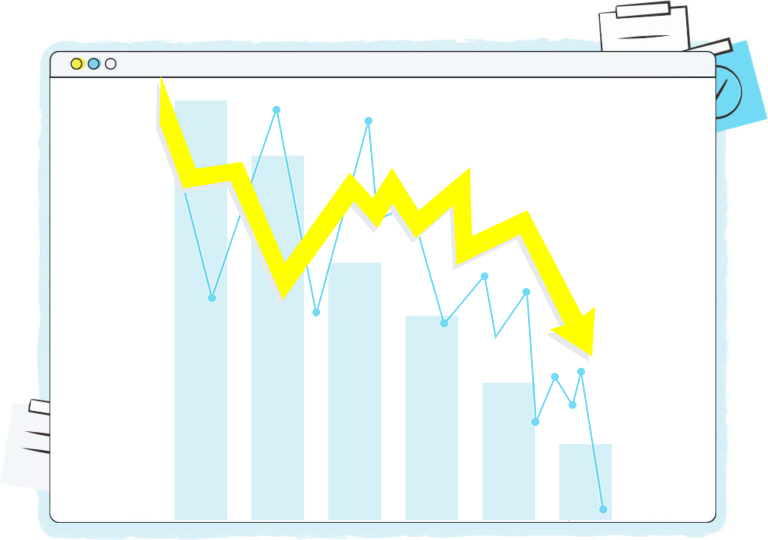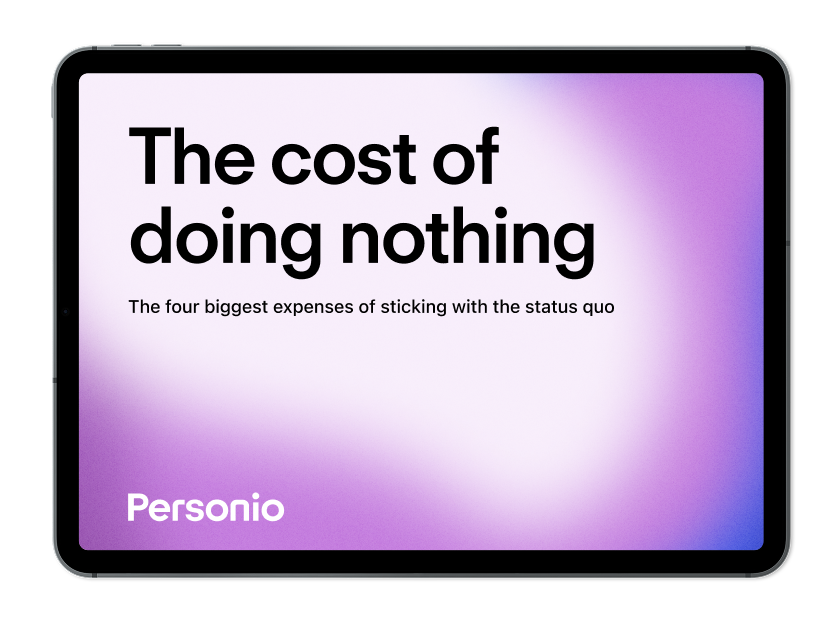14. April 2020
Haven’t you digitalized yet? These Are the Consequences of Waiting

Sudden crises such as the corona virus emergency show just how important flexible, agile HR management is. Digital processes are the ultimate tool for achieving this, but too many companies are still hesitant to launch into the digital transformation of their HR processes. In this article, we explain the consequences hesitation may have for your HR and your company's success.
Download our guide to developing your organization’s own people strategy today.Why Digitalize?
It is becoming clearer and clearer that companies benefit from digital processes in many ways. According to the European SME survey 2019, 57% of SMEs think that digitalization will have a positive impact on their company’s business over the next five years. Yet, HR often lags behind as an area where digital transformation tends to take a long time.
Digitalized HR processes make HR 20 to 30% more efficient, giving them more time for topics like employee retention. Optimized HR processes guarantee a positive employee experience and thus make them key factors for employee retention and motivation.
Yet a digitalized HR department constitutes a decisive competitive edge. It establishes the foundation for creating efficient work processes throughout your company. For HR managers, this primarily means more time and space for focusing on their company’s most important resource: its employees.
HR Is Still Too Timid
Unfortunately, HR still tends to be one of the areas in which decisions are made very slowly, especially when it comes to the development of new processes, initiatives and tools. Many might flinch or roll their eyes whenever they hear the word "digitalization" – too much effort, too much money and no obvious reason for changing things at this point in time.
However, both HR managers and CEOs need to recognize that dragging these decisions out will ultimately have a major negative effect on their companies’ profitability. This affects areas such as employee retention, training and slow hiring processes. The longer you wait, the more expensive things will get. That’s why it is essential that HR keeps the damage in mind that is caused by failing to digitalize sooner rather than later.
The Top Cost Drivers in HR

What’s really costing your HR the most? Our guide takes you through five biggest cost drivers in HR — and, shows you how to expertly handle them.
The cost of doing nothing: Download Our GuideThe 6 Consequences of Doing Nothing
Problems rarely vanish by themselves if they’re not actively addressed early on. On the contrary: Over time, they tend to build up and worsen, and ultimately they can even cause extensive losses. The following list shows you what can happen if you delay the digital transformation in your HR.
1. Recurring Damage
If, for example, your onboarding process is anything but seamless, if you need to invest a lot of time in scheduling tasks manually and your colleagues complete their onboarding tasks too late, new hires may find that their workspace isn’t set up, equipment is missing and their first day in their new job is poorly organised.
As a result, they’ll feel uneasy right from the start, which will affect their loyalty to their new company. What’s more, it will take longer before they reach full productivity, which is bad for your sales.
If you fail to address this type of ineffective processes immediately, the resulting damage will worsen from one year to the next, making you less and less efficient.
2. Exponentially Increasing Damage
A study initiated by Personio and conducted by Bitkom has shown that HR managers spend 42% of their time on administrative tasks. It’s therefore not surprising that important activities such as leadership development are often delayed – or need to be shelved. But that costs a lot of money.
Imagine a poor manager not only employing unsuitable staff, but also failing to unlock existing employees’ full potential. They’ll weaken your company, damage the company’s results and affect sales.
3. Delayed Sales Growth
The longer you wait before you digitalize, the longer you’ll miss out not only on increased sales, but also on other benefits associated with digitalized HR processes. Projects may be delayed if you’re short of IT staff due to slow recruiting processes, for example. This has a negative impact on your sales. Not so with digitalized recruiting processes. For example, you’ll gain more reliable data on how each of the various recruiting channels you use performs, which allows you to invest more in successful channels to boost your hiring.
Or if you are able to fill sales positions within only 30 rather than 40 days thanks to more efficient, digitalized recruiting processes, you’ll gain ten days during which these new hires can actively sell your product.
4. Lag Behind Competitors
According to the European SME survey 2019, two thirds of European SMEs are at least partly digitalized.. For you, this means that the longer you delay digitalizing your own HR, the further you’ll eventually lag behind your competitors in terms of employer branding, employee retention and recruiting. Your digitalized peers, in contrast, have software take care of cumbersome administrative tasks, leaving them with more time for issues that make a difference in HR.
5. Impossibility of Catching Up
A bitter, yet everything but far-fetched consequence of doing nothing is that you may never be able to catch up with your competitors. Once another company from the same industry has successfully built its brand as a leading employer, for example, it will be the one to attract all the best talent and dominate recruiting in the field. Even years down the road, it will be difficult for you to reach the same level as your industry peers.
6. Mistakes Caused by Frantic Efforts to Catch Up
Imagine that you realize data protection is a serious problem within your HR management and recruitment processes. You may need to update your processes within a very short time and possibly rely on external consultants in doing so, causing even greater costs. And suddenly the problem has turned into a crisis!
Everybody involved then needs to dedicate their existing resources to managing the crisis (causing staff costs to go up), and decisions may be made too hastily, for example on one software provider over another. Hasty decisions are often the first ones that come to mind rather than the best ones, and they can lead to disappointing results.
A High Price to Pay in Terms of Your HR Image
As an HR manager, you drive your company’s success by finding, retaining and developing your company’s most important resource, namely its employees. Without your employees’ contributions, which you can actively enhance, your company can’t perform. Think about meeting the high standards set by your corporate and HR image by digitalizing your HR department and all associated processes. This step is an active investment in your company’s efficiency and productivity.
If you remain timid and passive, you not only risk financial harm, but may also damage your personal image. Colleagues may look at you as being indecisive and risk-averse, which will affect your standing within the company.

About Marina Buller
Marina is Content Marketing Manager at Personio and has dedicated herself entirely to HR and recruiting topics. After completing her master's degree in Lund, Sweden, she gained HR insights while working at XING. She now incorporates this experience into her texts - always following Personio's motto of "simplifying HR work".

